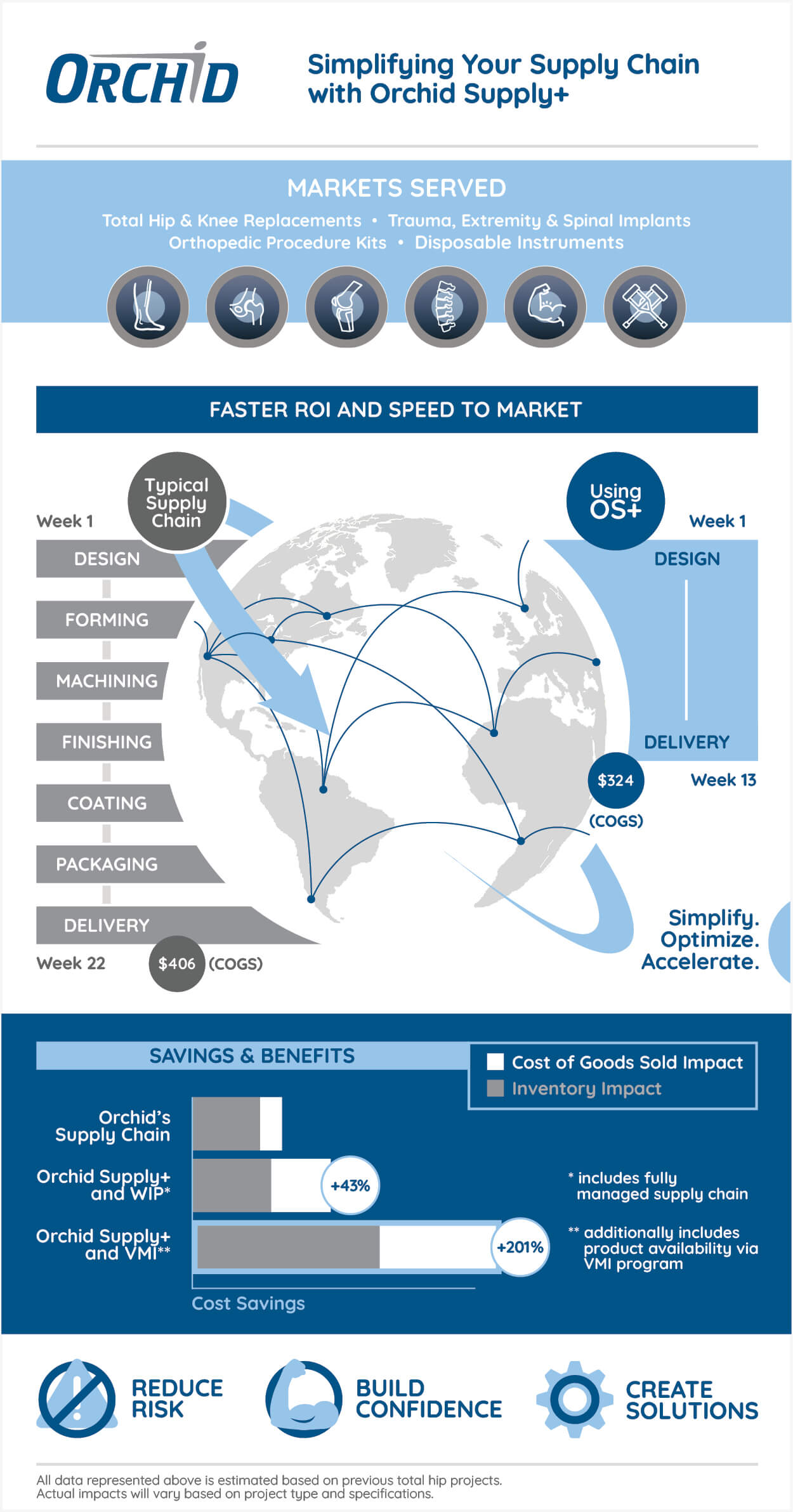Summary:
- Major orthopedic device companies have begun shifting the entire manufacturing and sourcing of certain products to their suppliers to allow a renewed focus on design, innovation and marketing of their products.
- Other industries, such as automotive, have followed a similar model successfully for decades.
- Orchid Orthopedic Solutions has emerged as a leading supplier partner. Enablers such as IBP, APQP and best-in-class manufacturing have positioned Orchid to deliver successfully.
- Improvements using Orchid’s model include reduced COGS, increased profit and 24-hour order replenishment.
If you talk with contract manufacturers serving the orthopedic device industry, a select few will say they are moving away from creating manufactured components using OEM provided specifications to actually participating in the development cycle — adding in the design, regulatory approval and much more.
Now the orthopedic outsourcing space is moving to the next level, with major device companies handing off the entire manufacturing, sourcing and logistics of certain products to their suppliers. Major industry supplier, Orchid Orthopedic Solutions (Orchid), is positioning itself to be on the vanguard of this trend.
“Orchid has emerged as the leading candidate for supply chain consolidation, enabling our customers to shift their focus from operations to growth drivers, such as design and marketing,” said Scott Reese, director of business development at Orchid.
In many ways, the medical device orthopedics space is catching up to where industries such as automotive, pharmaceuticals and aerospace have been for decades with their supply chains. The auto industry, for example, has Michelin and Bridgestone tires, Lear automotive seats and Brembro brakes. Automotive OEMs rely on their design and supply chain partners for their unique expertise in tires, seats and brakes, enabling them access to cost-effective design and manufacturing solutions.
“Orthopedic OEM growth has been constrained by the bandwidth of their operations, reducing their ability to launch new products. OEMs would rather invest in cost-effective technology than in expanding their operations,” Reese said.
In the ortho device space, Orchid has recognized a need to combine in-house design and manufacturing. This transition matters because it provides cost and resource savings to ortho device companies, allowing them to reallocate capital to invest in the next big thing — digital features, robotics and more.
Mergers and acquisitions, with the intention of snapping up innovative technologies, have resulted in unnecessarily complex supply chains. It doesn’t have to be this way anymore. OEMs can now look to organizations like Orchid to optimize or reduce complexity and take advantage of opportunities to better utilize cash currently spent on inefficient operations.
Now that the COVID-19 pandemic has hit and created uncertainty in demand for elective procedures, orthopedic device companies have been forced to re-assess their fixed costs. Some elements of consideration are scale of operations, business continuity plans and re-allocation of budgets that allow for continued innovation of clinically-effective products.
“The major ortho device companies need more than ever to find efficiencies to reduce expenses. We enable their growth by eliminating constraints caused by their internal operations,” Reese said.
Orchid’s full solution management has already provided results for customers. For example, Orchid was able to reduce the cost of goods sold (COGS) for a customer’s complex eternal fixator comprised of 56 components with a 22-week lead time. Orchid reduced the COGS for the product through supply-chain optimization, delivering an additional $130 gross profit per unit to the company.
Additionally, the Vendor Managed Inventory (VMI) program resulted in significantly improved ROI through reduced carrying costs and near-instant payback on the investment through 24-hour order replenishment.
Like major automotive suppliers, Orchid is a global company, formed through the acquisitions of best-in-class medical device suppliers with capabilities needed to provide complete orthopedic implant procedure solutions. The company has the broadest and deepest portfolio of services in the orthopedic industry. For example, Orchid provides services more than 30% of the world’s knee implants and more than 20% of the world’s hip implants.
When European private equity outfit Nordic Capital acquired Orchid in 2019, the result was immediate infusion of capital to take the company to the next level.
A major step in Orchid’s evolution involved the application of integrated business planning (IBP).
“Implementation of IBP was an eye-opener for Orchid,” Reese said. “It helps us to connect the dots through each of our manufacturing modalities. Not only are we connected internally, but now we're also more aligned with our customer's forecasting tools, which enables us to better predict our customer’s demand. This allows us to challenge information and partner with our customers to adapt to and predict changes in their business.”
Orchid is also three years down the road of advanced product quality planning (APQP) — the same planning for production principles that the automotive and semiconductor industries have used on their supply chains.
“APQP is creating a plan for success in advance of production. It’s anticipating failures, not just reacting to them. Robust quality plans are needed so that you have a very capable and resilient process that all parties can be confident in,” Reese said.
Having all of Orchid’s sites onboard with IBP and APQP has propelled the company forward, similar to the maturity path found in the automotive industry.
OEMs demand more than manufacturing from their critical partners. They are seeking full solutions that result in profit and loss (P&L) improvements, which can only be achieved through partners who are capable of taking on greater supply chain and development responsibilities.
“Orchid has purposefully built an organization that resembles our customers’ operations, delivers with high confidence and provides new technologies that advance healthcare, all while moving fixed cost out of the OEM P&L,” Reese said.
Supply chain leaders had been advocating for this strategy for some time, and now the impact to supply chain from COVID-19 will accelerate the consolidation to more comprehensive suppliers that deliver transformative and cost effective innovation.
“Orchid continues to build on past successes with an eye on the future to support customers who demand more than manufacturing from their contract partners,” said Reese.
